When working on NerdTechy, we spend a lot of time on the computer. With this is mind, we’re obviously huge fans of any technology that can help us be more productive, and make our work easier. It doesn’t matter whether you’re a grad student working on your thesis, or just doing a little research for a personal project. Whenever you’re getting information off the internet, having a second monitor is one of the best decisions you could make.
Unfortunately, dual monitors are losing popularity in our increasingly mobile lifestyles. While it’s no problem to hook up another display to your desktop computer, most hardware isn’t designed to be used with laptops or tablets.
The main issue is that portable computers just don’t have the outputs for a second screen. Some laptops come with HDMI ports, but most cannot use both the external display and an internal display at the same time. Fortunately, there is a solution.
Portable USB-C monitors don’t require advanced graphics hardware to run them at the same time as your internal display. They’re also powered directly through the USB-C port, and use much less power than a standard display. We’ll be taking a look at one of the latest and most affordable USB-C monitors on the market. We’ll help you understand what this display has to offer, and help you decide if it belongs on your desk – wherever that may be.
First Look
AOC is a brand that’s come to be known as a bit of a pioneer in the affordable peripherals marketplace. While they aren’t the only USB-C monitor available, there are a few key differences between the AOC i1601fwux and others. It’s able to be used in both portrait and landscape mode, with the displays protective cover doubling as a stand. You don’t need any external power adapter – Just a USB-C cable. It’s lightweight, well made, and can easily be carried from place to place. You get all of that with a stunning 220 cd/m2 brightness and a resolution of 1080p, making this the perfect monitor for text or documents.
Design
Visually, the i1601fwux has a very clean design. The large black bezel and silver enclosure is definitely eye-catching. Taking it down to a coffee shop to get a little work done with our Surface Pro 4, we knew that we had the most enviable looking table in the whole shop.
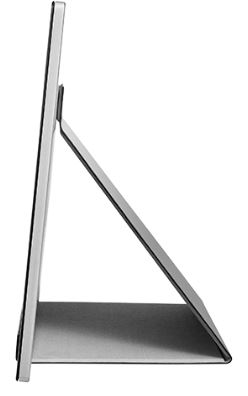
The face of the display is pretty simple, with only a shiny black bezel around the screen. The back, however, has a matte aluminum look to it, with the AOC logo embossed into the rear of the display. When the monitor is not in use, the cover protects the display from scratches. But this isn’t just your ordinary cover. It works a lot like the smart cover on an iPad, allowing it to double as a stand for the monitor. In landscape mode, you just fold the lower portion back to prevent it from falling over. In landscape mode, the rear can pivot and use two small lips to hold it upright. One grabs the monitor from the front, preventing it from falling forward. The other supports it from the back. Even though there is very little surface area contacting the ground, our monitor was very stable on our desk, showing that the cover / stand works very well.
Resolution
Even with 4K monitors and televisions becoming increasingly common, 1080p is still one of the most popular resolutions available. Text still looks fairly crisp and sharp, and images look great. But this isn’t going to be the sharpest and detailed looking display that you’ve come across. For reference, let’s compare it to two popular computers.
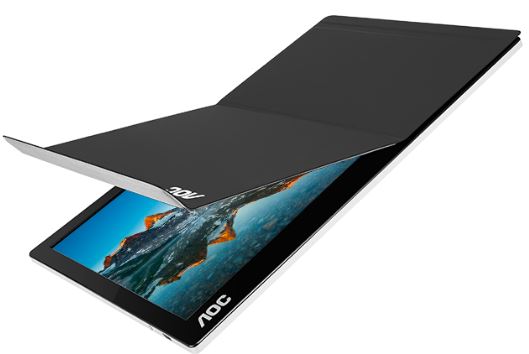
The Surface Pro, one of the devices we use commonly, has an extremely high resolution and a small display. The pixel density is a stunning 267 pixels per inch, which is widely regarded in the tech community as one of the most impressive displays in the portable market. On the other end of the spectrum, you’ve got the latest Macbook air. This laptop has a 1440 x 900 display which works out to be 128 pixels per inch. AOCs monitor clocks in at 141 ppi. It’s definitely sharper than the macbook air, but not quite as crisp as the Surface. This makes it ideal for text, graphics, and images. You can find higher resolution screens on the market, but they are not all that common. Still, this monitor just passes the threshold of “retina,” so you’re not going to suffer from blocky images.
Brightness & Contrast
The internal LED backlight is capable of producing a brightness of 220 cd/m2. This is a typical brightness for LED based displays. There are some styles, such as OLED, that produce an image that is a little brighter. But this is still one of the best styles on the market. In any indoor environment, this display looks excellent. It’s extremely clear and easy to read, although it’s not quite as bright as we’d like to see when in direct sunlight.
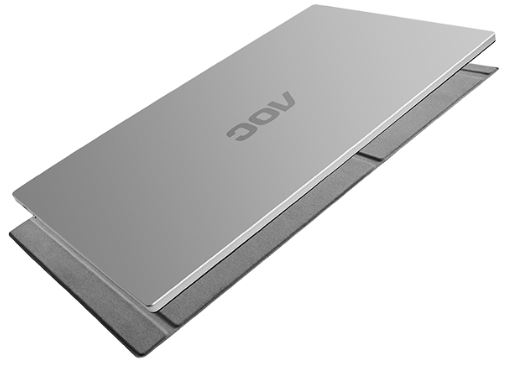
It has a dynamic contrast ratio. This means that the brightness of the screen can automatically be adjusted depending on what kind of content is shown on the display. Dynamic contrast has it’s advantages and disadvantages. If you’re watching a movie or playing games, the image is much better than anything with a static contrast rate. The cinematic effects of a motion picture is very consistent, making darker scenes dark and brighter scenes bright. When you’re editing text, dynamic contrast is less than ideal. It is a little more washed out. We did do some document editing, and we still found the display suitable. However, it’s not the best technology on the market for this purpose.

Color & Viewing Angle
These two factors depend on the type of panel used. Most affordable monitors use what’s called a TN panel – Twisted Nematic. This involves a nonlinear matrix of red, green, and blue LEDs. They’re not all grouped together, so multiple pixels share various sub pixels. But this panel uses a high end IPS panel. IPS stands for In Plane Switching. Each pixel has it’s own set of sub pixels, and can cycle between them. There are two main differences with this type of technology. First, colors are nearly perfect. What one pixel is displaying won’t affect the pixel beside it. With TN panels, having two brightly contrasting colors right next to each other can distort their neighbors.
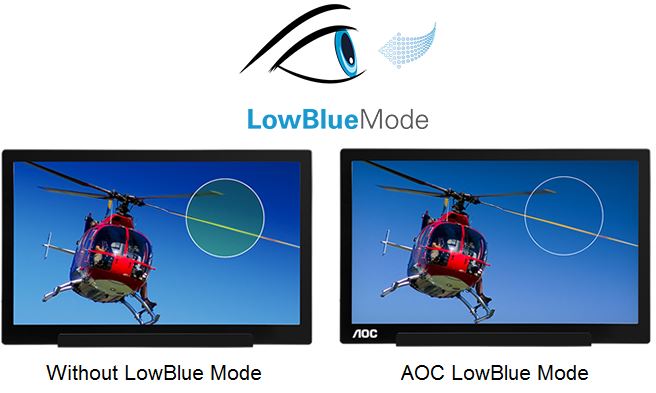
Another advantage of TN panels is the fact that the sub pixels are very close to the front of the screen. Ever look at an LCD from an angle and find that the colors are all distorted? This doesn’t happen with IPS. You get an extremely large viewing angle, you can view it at almost a 180 degree angle (178 to be exact) and the image will look perfect.
What does this mean for you? This IPS display is perfect for anyone who wants to edit videos or photos, and the rich, vibrant colors will make every image you view a treat.
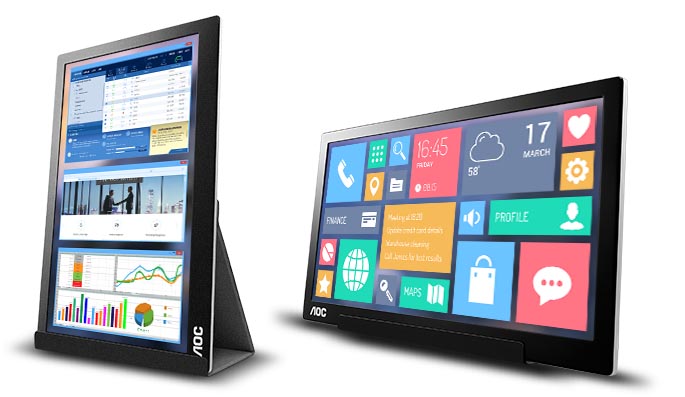
Disadvantages
If your laptop has USB-C, then getting this monitor up and running is extremely simple. You just plug in a single cable, which supplies both power and video. But there is one design flaw. Some monitors give you the option of using external power. This means that you could use an adapter to go from Display Port to USB-C and still use the monitor with an older computer. But when you’re USB-C only, adapter don’t work. This means that if you don’t have a USB-C port, this monitor isn’t for you.
Final Verdict
AOC isn’t always known as a brand that produces high end hardware. If you look at the price, you’d certainly consider this monitor to be an entry level product. However, there are a few things that separate this panel from comparably priced models. First, it runs exclusively off USB-C. This means that there are less cables to worry about, and the lower power draw will help prevent you from using all of the battery power, and keep your cables single and organized. But the most important feature of this monitor is the display type. And IPS screen has significantly better image quality than a standard TN panel.
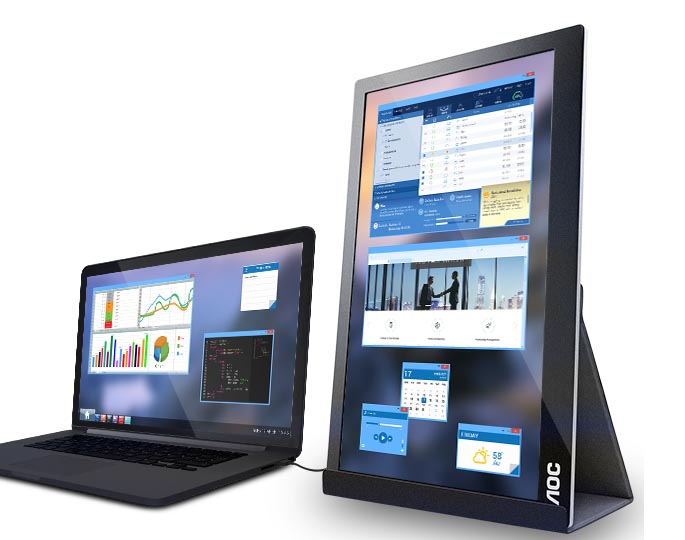
Sure, this display might be priced like an entry level model. But if you use it side by side a high end model, you’ll quickly realize that this is something that performs much better than the average portable monitor.
Portable displays are quickly moving form a niche product to a common piece of equipment. As such, the industry is quickly evolving. The AOC i1601fwux is one of the latest entrants to the market, and the best example of what is possible with modern hardware. If you’re looking for an external display to use with your portable computer, this is currently the one to get.
Meet Ry, “TechGuru,” a 36-year-old technology enthusiast with a deep passion for tech innovations. With extensive experience, he specializes in gaming hardware and software, and has expertise in gadgets, custom PCs, and audio.
Besides writing about tech and reviewing new products, he enjoys traveling, hiking, and photography. Committed to keeping up with the latest industry trends, he aims to guide readers in making informed tech decisions.

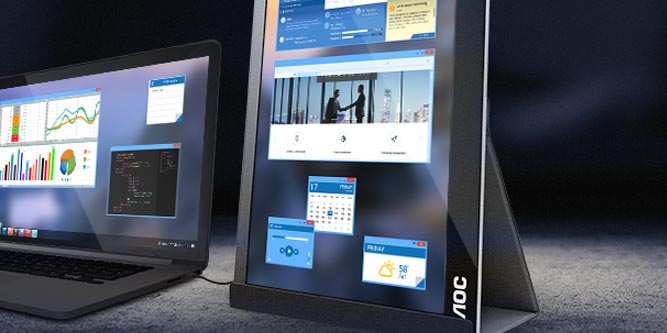
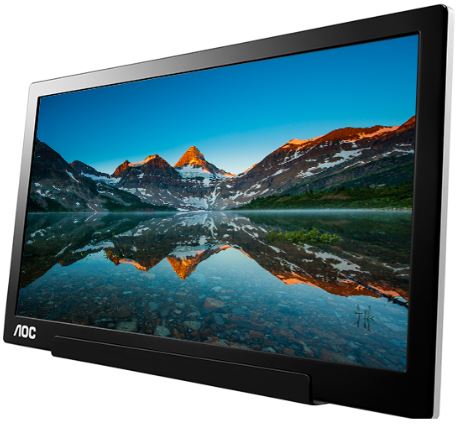
If you don’t have a USB-C port, which is the closest portable monitor? That you would recommend?
I have a Surface pro 4, and I bought this device from amazon as you said on a surface pro it will work. I downloaded all the correct drivers and am using a (surface port)USB – 3.0 to USB- type C(aoc-i1601fwux port), however the monitor is not registering my surface pro 4. How did you get this to work?????
great article! this will be my monitor 😉